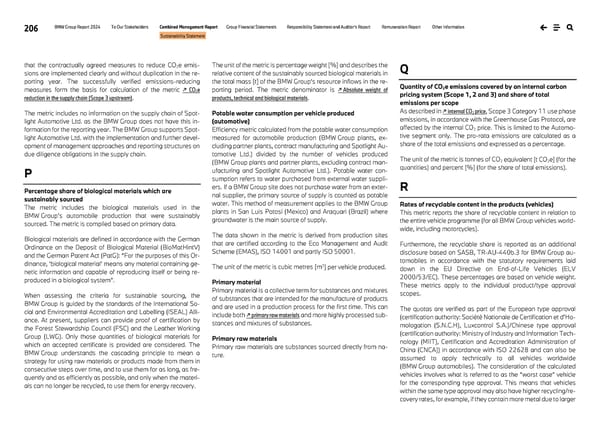206 BMW Group Report 2024 To Our Stakeholders Combined Management Report Group Financial Statements Responsibility Statement and Auditor’s Report Remuneration Report Other Information Sustainability Statement that the contractually agreed measures to reduce CO2e emis- sions are implemented clearly and without duplication in the re- porting year. The successfully verified emissions-reducing measures form the basis for calculation of the metric ↗ CO2e reduction in the supply chain (Scope 3 upstream). The metric includes no information on the supply chain of Spot- light Automotive Ltd. as the BMW Group does not have this in- formation for the reporting year. The BMW Group supports Spot- light Automotive Ltd. with the implementation and further devel- opment of management approaches and reporting structures on due diligence obligations in the supply chain. P Percentage share of biological materials which are sustainably sourced The metric includes the biological materials used in the BMW Group’s automobile production that were sustainably sourced. The metric is compiled based on primary data. Biological materials are defined in accordance with the German Ordinance on the Deposit of Biological Material (BioMatHintV) and the German Patent Act (PatG): “For the purposes of this Or- dinance, ‘biological material’ means any material containing ge- netic information and capable of reproducing itself or being re- produced in a biological system”. When assessing the criteria for sustainable sourcing, the BMW Group is guided by the standards of the International So- cial and Environmental Accreditation and Labelling (ISEAL) Alli- ance. At present, suppliers can provide proof of certification by the Forest Stewardship Council (FSC) and the Leather Working Group (LWG). Only those quantities of biological materials for which an accepted certificate is provided are considered. The BMW Group understands the cascading principle to mean a strategy for using raw materials or products made from them in consecutive steps over time, and to use them for as long, as fre- quently and as efficiently as possible, and only when the materi- als can no longer be recycled, to use them for energy recovery. The unit of the metric is percentage weight [%] and describes the relative content of the sustainably sourced biological materials in the total mass [t] of the BMW Group’s resource inflows in the re- porting period. The metric denominator is ↗ Absolute weight of products, technical and biological materials. Potable water consumption per vehicle produced (automotive) Efficiency metric calculated from the potable water consumption measured for automobile production (BMW Group plants, ex- cluding partner plants, contract manufacturing and Spotlight Au- tomotive Ltd.) divided by the number of vehicles produced (BMW Group plants and partner plants, excluding contract man- ufacturing and Spotlight Automotive Ltd.). Potable water con- sumption refers to water purchased from external water suppli- ers. If a BMW Group site does not purchase water from an exter- nal supplier, the primary source of supply is counted as potable water. This method of measurement applies to the BMW Group plants in San Luis Potosí (Mexico) and Araquari (Brazil) where groundwater is the main source of supply. The data shown in the metric is derived from production sites that are certified according to the Eco Management and Audit Scheme (EMAS), ISO 14001 and partly ISO 50001. The unit of the metric is cubic metres [m3] per vehicle produced. Primary material Primary material is a collective term for substances and mixtures of substances that are intended for the manufacture of products and are used in a production process for the first time. This can include both ↗ primary raw materials and more highly processed sub- stances and mixtures of substances. Primary raw materials Primary raw materials are substances sourced directly from na- ture. Q Quantity of CO2e emissions covered by an internal carbon pricing system (Scope 1, 2 and 3) and share of total emissions per scope As described in ↗ internal CO2 price, Scope 3 Category 11 use phase emissions, in accordance with the Greenhouse Gas Protocol, are affected by the internal CO2 price. This is limited to the Automo- tive segment only. The pro-rata emissions are calculated as a share of the total emissions and expressed as a percentage. The unit of the metric is tonnes of CO2 equivalent [t CO2e] (for the quantities) and percent [%] (for the share of total emissions). R Rates of recyclable content in the products (vehicles) This metric reports the share of recyclable content in relation to the entire vehicle programme (for all BMW Group vehicles world- wide, including motorcycles). Furthermore, the recyclable share is reported as an additional disclosure based on SASB, TR-AU-440b.3 for BMW Group au- tomobiles in accordance with the statutory requirements laid down in the EU Directive on End-of-Life Vehicles (ELV 2000/53/EC). These percentages are based on vehicle weight. These metrics apply to the individual product/type approval scopes. The quotas are verified as part of the European type approval (certification authority: Société Nationale de Certification et d'Ho- mologation (S.N.C.H), Luxcontrol S.A.)/Chinese type approval (certification authority: Ministry of Industry and Information Tech- nology (MIIT), Certification and Accreditation Administration of China (CNCA)) in accordance with ISO 22628 and can also be assumed to apply technically to all vehicles worldwide (BMW Group automobiles). The consideration of the calculated vehicles involves what is referred to as the “worst case” vehicle for the corresponding type approval. This means that vehicles within the same type approval may also have higher recycling/re- covery rates, for example, if they contain more metal due to larger
 BMW Group Report 2024 Page 205 Page 207
BMW Group Report 2024 Page 205 Page 207